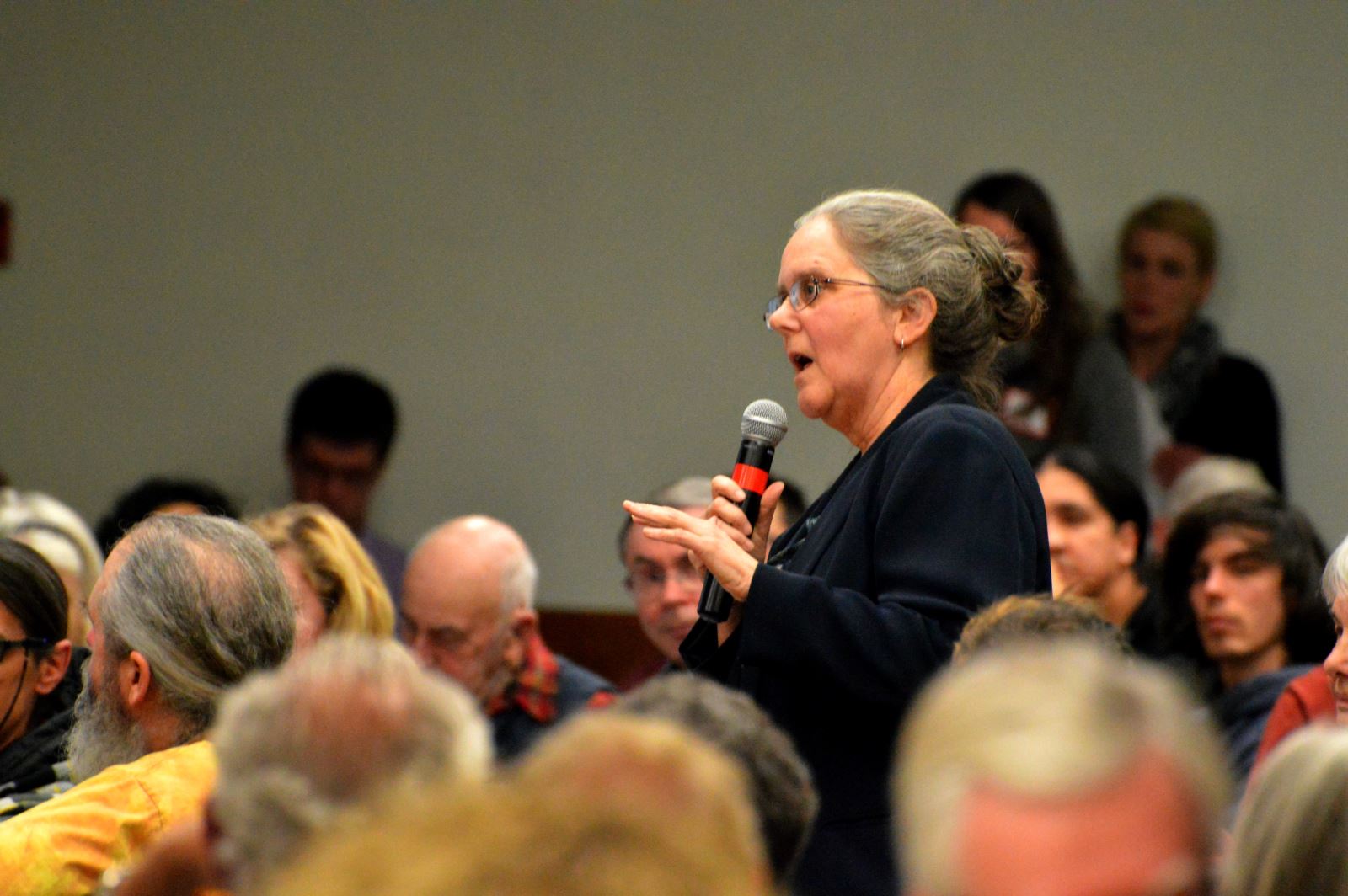 Brennain Lloyd, project coordinator of Northwatch, asks the Ontario Energy Board representatives a question after being briefed on the OEB's review of the proposed Energy East Pipeline at the Royal Canadian Legion on Wednesday night. PHOTO BY LIAM BERTI
Brennain Lloyd, project coordinator of Northwatch, asks the Ontario Energy Board representatives a question after being briefed on the OEB's review of the proposed Energy East Pipeline at the Royal Canadian Legion on Wednesday night. PHOTO BY LIAM BERTI
To say that North Bay residents are concerned for the safety of their drinking water would be an understatement.
Hundreds of passionate locals turned out to be briefed on the Ontario Energy Board’s review of TransCanada’s proposed Energy East Pipeline application on Wednesday night, many of who left visibly dissatisfied with what they were told.
The OEB consulted with a number of technical experts to assess TransCanada’s application based on what the communities expressed concern for during the first round of public consultations last year.
But the application, which was said to be upwards of 30,000 pages long, has been deemed incomplete by the OEB and, therefore, could not be assessed beyond a high-level assessment.
“We acknowledged when we filed it that there was information yet to come, and we acknowledge that there are studies and interactions with the community on various subjects that are going to happen over the next year or two years,” Gary Houston, TransCanada Pipelines' vice-president, Ontario and Prairies, Energy East Pipeline, explained in an interview after the discussion.
The audience was not satisfied with that lack of information, which was one of the major areas of contention from the North Bay residents, who provided a flurry of heated questions towards the OEB and technical consultants.
“TransCanada’s application has huge gaps; when they filed it in October, they said they were going to provide important sections before the end of 2014, and they haven’t,” said Brennain Lloyd, Northwatch project coordinator.
“Important sections like ecological risk assessment, human health risk assessment; those are fundamental to the review,” she added. “The OEB hired experts to review the TransCanada application and they couldn’t do it because these parts were missing.”
The preliminary project design calls for the conversion of the pipeline that crosses several tributaries of Trout Lake, North Bay’s sole source of drinking water. Some of those waterways include Chippewa Creek, Doran’s Creek and Four Mile Creek.
Based on the limited information in the application though, Dean Mutrie of DNV.GL consulting services explained the potential spill risks and the impact it would have on the source of drinking water.
Specifically, he said that a pipeline spill into Doran Creek would take 3.7 hours to travel the 7.9-kilometres into Trout Lake. Once in the lake, the spill contents would then take approximately 5.3 hours to reach the water treatment facility.
He also simulated a spill into Four Mile Creek, which he said would take 2.5 hours to reach the lake and some 54 hours to reach the treatment facility.
Based on those scenarios, Mutrie said the OEB proposes that TransCanada reroute where the pipeline may be too close to sensitive water resources or, at least, justify why it shouldn’t be rerouted.
But the TransCanada representatives argued that recommendation.
“I think there’s a lot of reasons not to [move the pipeline],” Houston said after the meeting. “The existing pipeline is already built and so we would be avoiding additional environmental impact associated with new construction, so there’s a sound reason for not moving it.”
TransCanada’s application concludes that “no effects to the water quality at the North Bay intake are expected” and that they commit to provide alternative sources of drinking water in the event of a spill.
“Our challenge is to help people understand that it’s a safe process,” said Houston. “If anyone can build a safe pipeline, Canadians can.”
North Bay resident and city councillor Chris Mayne seemed to encapsulate the crowd’s feelings when he delivered a comment to the OEB during the question period.
“All we have been doing is discussing risk; to the citizens of North Bay and in this area, there is no acceptable level of risk,” Mayne said bluntly.
“Everyone in this community is right now preparing to spend $250,000 to address concerns that the province was not prepared to address on our behalf,” he said. “I find that offensive and I hope you will reconsider a position on that.”
Other public comments and questions dismissed the presentations and questioned the validity of the limited information that TransCanada provided for the OEB to study.
“You can’t base your studies on what they have provided,” said Stephen J. Courtney, an independent geo spatial consultant, who displayed his own geo analytical study of the impact a spill would have on the watershed.
He said based on his own independent studies, he thinks TransCanada has not done its due diligence or are not being completely transparent in their reports, which the OEB based their analysis on.
The audience was ultimately asked to make recommendations on what the OEB's report to the Minister of Energy should focus on. That final report is expected to be filed with the Minister in March.
However, as the OEB representatives made clear on Wednesday night, the sole jurisdiction over the pipeline and the final decision lies with the federal government.
The NEB is responsible for reviewing proposals to convert or construct pipelines, while the federal cabinet has the final say over the construction of new pipelines.
First though, in addition to completing their meetings with local communities, the First Nation and Metis communities, the OEB is holding a conference in Ottawa on January 29 where the broader issues of economic impact, pipeline safety, climate change and gas supply will be discussed.


